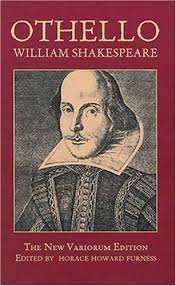Othello Page #10
Othello is a tragedy by William Shakespeare, believed to have been written in 1603. It is based on the story Un Capitano Moro by Cinthio, a disciple of Boccaccio, first published in 1565.
Iago. How poore are they that haue not Patience? What wound did euer heale but by degrees? Thou know'st we worke by Wit, and not by Witchcraft And Wit depends on dilatory time: Dos't not go well? Cassio hath beaten thee, And thou by that small hurt hath casheer'd Cassio: Though other things grow faire against the Sun, Yet Fruites that blossome first, will first be ripe: Content thy selfe, a-while. Introth 'tis Morning; Pleasure, and Action, make the houres seeme short. Retire thee, go where thou art Billited: Away, I say, thou shalt know more heereafter: Nay get thee gone. Exit Roderigo. Two things are to be done: My Wife must moue for Cassio to her Mistris: Ile set her on my selfe, a while, to draw the Moor apart, And bring him iumpe, when he may Cassio finde Soliciting his wife: I, that's the way: Dull not Deuice, by coldnesse, and delay. Enter. Actus Tertius. Scena Prima. Enter Cassio, Musitians, and Clowne. Cassio. Masters, play heere, I wil content your paines, Something that's briefe: and bid, goodmorrow General Clo. Why Masters, haue your Instruments bin in Naples, that they speake i'th' Nose thus? Mus. How Sir? how? Clo. Are these I pray you, winde Instruments? Mus. I marry are they sir Clo. Oh, thereby hangs a tale Mus. Whereby hangs a tale, sir? Clow. Marry sir, by many a winde Instrument that I know. But Masters, heere's money for you: and the Generall so likes your Musick, that he desires you for loues sake to make no more noise with it Mus. Well Sir, we will not Clo. If you haue any Musicke that may not be heard, too't againe. But (as they say) to heare Musicke, the Generall do's not greatly care Mus. We haue none such, sir Clow. Then put vp your Pipes in your bagge, for Ile away. Go, vanish into ayre, away. Exit Mu. Cassio. Dost thou heare me, mine honest Friend? Clo. No, I heare not your honest Friend: I heare you Cassio. Prythee keepe vp thy Quillets, ther's a poore peece of Gold for thee: if the Gentlewoman that attends the Generall be stirring, tell her, there's one Cassio entreats her a little fauour of Speech. Wilt thou do this? Clo. She is stirring sir: if she will stirre hither, I shall seeme to notifie vnto her. Exit Clo. Enter Iago. In happy time, Iago Iago. You haue not bin a-bed then? Cassio. Why no: the day had broke before we parted. I haue made bold (Iago) to send in to your wife: My suite to her is, that she will to vertuous Desdemona Procure me some accesse Iago. Ile send her to you presently: And Ile deuise a meane to draw the Moore Out of the way, that your conuerse and businesse May be more free. Exit Cassio. I humbly thanke you for't. I neuer knew A Florentine more kinde, and honest. Enter aemilia. Aemil. Goodmorrow (good Lieutenant) I am sorrie For your displeasure: but all will sure be well. The Generall and his wife are talking of it, And she speakes for you stoutly. The Moore replies, That he you hurt is of great Fame in Cyprus, And great Affinitie: and that in wholsome Wisedome He might not but refuse you. But he protests he loues you And needs no other Suitor, but his likings To bring you in againe Cassio. Yet I beseech you, If you thinke fit, or that it may be done, Giue me aduantage of some breefe Discourse With Desdemon alone. Aemil. Pray you come in: I will bestow you where you shall haue time To speake your bosome freely Cassio. I am much bound to you. Scoena Secunda. Enter Othello, Iago, and Gentlemen. Othe. These Letters giue (Iago) to the Pylot, And by him do my duties to the Senate: That done, I will be walking on the Workes, Repaire there to mee Iago. Well, my good Lord, Ile doo't Oth. This Fortification (Gentlemen) shall we see't? Gent. Well waite vpon your Lordship. Exeunt. Scoena Tertia. Enter Desdemona, Cassio, and aemilia. Des. Be thou assur'd (good Cassio) I will do All my abilities in thy behalfe. Aemil. Good Madam do: I warrant it greeues my Husband, As if the cause were his Des. Oh that's an honest Fellow, Do not doubt Cassio But I will haue my Lord, and you againe As friendly as you were Cassio. Bounteous Madam, What euer shall become of Michael Cassio, He's neuer any thing but your true Seruant Des. I know't: I thanke you: you do loue my Lord: You haue knowne him long, and be you well assur'd He shall in strangenesse stand no farther off, Then in a politique distance Cassio. I, but Lady, That policie may either last so long, Or feede vpon such nice and waterish diet, Or breede it selfe so out of Circumstances, That I being absent, and my place supply'd, My Generall will forget my Loue, and Seruice Des. Do not doubt that: before aemilia here, I giue thee warrant of thy place. Assure thee, If I do vow a friendship, Ile performe it To the last Article. My Lord shall neuer rest, Ile watch him tame, and talke him out of patience; His Bed shall seeme a Schoole, his Boord a Shrift, Ile intermingle euery thing he do's With Cassio's suite: Therefore be merry Cassio, For thy Solicitor shall rather dye, Then giue thy cause away. Enter Othello, and Iago. Aemil. Madam, heere comes my Lord Cassio. Madam, Ile take my leaue Des. Why stay, and heare me speake Cassio. Madam, not now: I am very ill at ease, Vnfit for mine owne purposes Des. Well, do your discretion. Exit Cassio. Iago. Hah? I like not that Othel. What dost thou say? Iago. Nothing my Lord; or if- I know not what Othel. Was not that Cassio parted from my wife? Iago. Cassio my Lord? No sure, I cannot thinke it That he would steale away so guilty-like, Seeing your comming Oth. I do beleeue 'twas he Des. How now my Lord? I haue bin talking with a Suitor heere, A man that languishes in your displeasure Oth. Who is't you meane? Des. Why your Lieutenant Cassio: Good my Lord, If I haue any grace, or power to moue you, His present reconciliation take. For if he be not one, that truly loues you, That erres in Ignorance, and not in Cunning, I haue no iudgement in an honest face. I prythee call him backe Oth. Went he hence now? Des. I sooth; so humbled, That he hath left part of his greefe with mee To suffer with him. Good Loue, call him backe Othel. Not now (sweet Desdemon) some other time Des. But shall't be shortly? Oth. The sooner (Sweet) for you Des. Shall't be to night, at Supper? Oth. No, not to night Des. To morrow Dinner then? Oth. I shall not dine at home: I meete the Captaines at the Cittadell Des. Why then to morrow night, on Tuesday morne, On Tuesday noone, or night; on Wensday Morne. I prythee name the time, but let it not Exceed three dayes. Infaith hee's penitent: And yet his Trespasse, in our common reason (Saue that they say the warres must make example) Out of her best, is not almost a fault T' encurre a priuate checke. When shall he come? Tell me Othello. I wonder in my Soule What you would aske me, that I should deny, Or stand so mam'ring on? What? Michael Cassio, That came a woing with you? and so many a time (When I haue spoke of you dispraisingly) Hath tane your part, to haue so much to do To bring him in? Trust me, I could do much
Translation
Translate and read this book in other languages:
Select another language:
- - Select -
- 简体中文 (Chinese - Simplified)
- 繁體中文 (Chinese - Traditional)
- Español (Spanish)
- Esperanto (Esperanto)
- 日本語 (Japanese)
- Português (Portuguese)
- Deutsch (German)
- العربية (Arabic)
- Français (French)
- Русский (Russian)
- ಕನ್ನಡ (Kannada)
- 한국어 (Korean)
- עברית (Hebrew)
- Gaeilge (Irish)
- Українська (Ukrainian)
- اردو (Urdu)
- Magyar (Hungarian)
- मानक हिन्दी (Hindi)
- Indonesia (Indonesian)
- Italiano (Italian)
- தமிழ் (Tamil)
- Türkçe (Turkish)
- తెలుగు (Telugu)
- ภาษาไทย (Thai)
- Tiếng Việt (Vietnamese)
- Čeština (Czech)
- Polski (Polish)
- Bahasa Indonesia (Indonesian)
- Românește (Romanian)
- Nederlands (Dutch)
- Ελληνικά (Greek)
- Latinum (Latin)
- Svenska (Swedish)
- Dansk (Danish)
- Suomi (Finnish)
- فارسی (Persian)
- ייִדיש (Yiddish)
- հայերեն (Armenian)
- Norsk (Norwegian)
- English (English)
Citation
Use the citation below to add this book to your bibliography:
Style:MLAChicagoAPA
"Othello Books." Literature.com. STANDS4 LLC, 2024. Web. 23 Dec. 2024. <https://www.literature.com/book/othello_14>.




Discuss this Othello book with the community:
Report Comment
We're doing our best to make sure our content is useful, accurate and safe.
If by any chance you spot an inappropriate comment while navigating through our website please use this form to let us know, and we'll take care of it shortly.
Attachment
You need to be logged in to favorite.
Log In